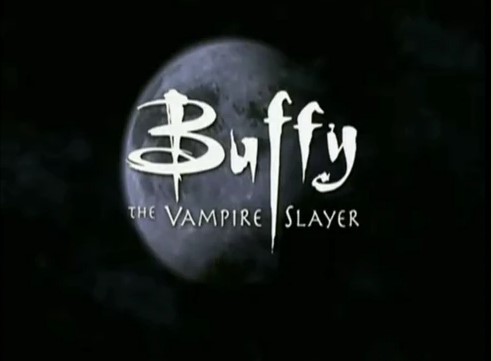
Into Every Generation a Cursed Protagonist is Born: Buffy the Vampire Slayer
January 15, 2024
Dad: This is a show where a teenager has to go to school during the day and fight vampires at night, and there's a vampire every night.
Me: When does she sleep?
Dad: Probably the weekends when the show isn't on.
- An actual conversation I had c. age 6 or 7

Welcome, dear readers, to the official introduction to our next contestant franchise, Buffy the Vampire Slayer. BTVS is a show that many a person has recommended to me over the years, starting with my dad (hi, Dad!) I resisted for a long time because I'd heard the creator is a chauvinist pig. (Spoiler alert: he is.) I've finally watched it now because it happens to be the #1 most commonly mentioned example of a female protagonist with the Cartwright Curse. As you may have surmised from the fact that I wrote two posts about it while I was still watching, I have some thoughts.
The Franchise
Buffy the Vampire Slayer has a relatively simple premise: once a generation, a teenaged girl is chosen to fight vampires, demons, and other assorted forces of darkness. (Yes, this does mean that it's about a teenage girl being held responsible for the welfare, and behavior, of adults. The commentary writes itself!)
In this universe, vampires are unnaturally strong, and can only be killed by staking, decapitation, burning, or exposure to sunlight. There are also a lot of them, rising up from graves left, right, and center. On top of which, Buffy Summers also has to deal with gods, demons, demonic gods, mad scientists, rogue robots, wicked witches, werewolves, parasites, sea monsters, hyena people, bug people, invisible people, zombies, ghosts, hellhounds... Her enemies list is somehow even longer than the Winchesters' from Supernatural, is what I'm telling you. In seven seasons, she faces eight separate apocalypses.
If the apocalypse comes, beep me. - via GIPHY
Spike: We [vampires] just keep coming. But you can kill a hundred, a thousand, a thousand thousand and the armies of Hell besides, and all we need... is for one of us, just one, sooner or later to have the thing we're all hoping for.
Buffy: And that would be what?
Spike: One good day.
- "Fool for Love" (2000-11-14)
To make fighting all these baddies easier, Slayers like Buffy get superpowers, such as enhanced strength and reflexes. But chosen ones also have massive targets on their back, which makes for shortened life expectancy. Consequently, Slayers have to try to fit in as much living as possible while also fighting to rid the world of evil. Hilarity and drama both ensue.
Bystander: But you're just a girl!
Buffy: That's what I keep saying!
- "The Gift" (2001-05-22)
Throughout the franchise, Buffy tries to do normal teenage-girl stuff, such as graduating high school, going to frat parties, and dating. None of it quite works out. The graduation turns into a battlefield when the commencement speaker transforms into a giant snake.
Doyle: Your high school diploma is all burned.
Cordelia: Yeah, it was a rough ceremony.
- Angel "Rm w/a Vu" (1999-11-02)
The frat parties repeatedly turn out to involve human sacrifices.
Xander: Is every frat on this campus haunted? And if so, why do people keep coming to these parties, cause it's not the snacks!
- "Where the Wild Things Are" (2000-04-25)
And as for the dating, well...see the title of this blog.
Buffy: Let's face it, none of us will ever have a happy, normal relationship.
Xander: We're doomed!
- "I Robot, You Jane" (1997-04-28)
Buffy doesn't get much time to herself, in other words. In fact, not even death gives her a break. She gets resurrected against her will twice - once with CPR performed by her best guy friend Xander, and once with a universe-destabilizing act of Black Magick performed by her best-girlfriend-turned-Wicked-Witch-of-the-West, Willow. It is perhaps not surprising that by series' end, she's dealing with serious psychological problems from all this complex trauma. Yet she has to keep pulling herself together and caring for everyone around her.
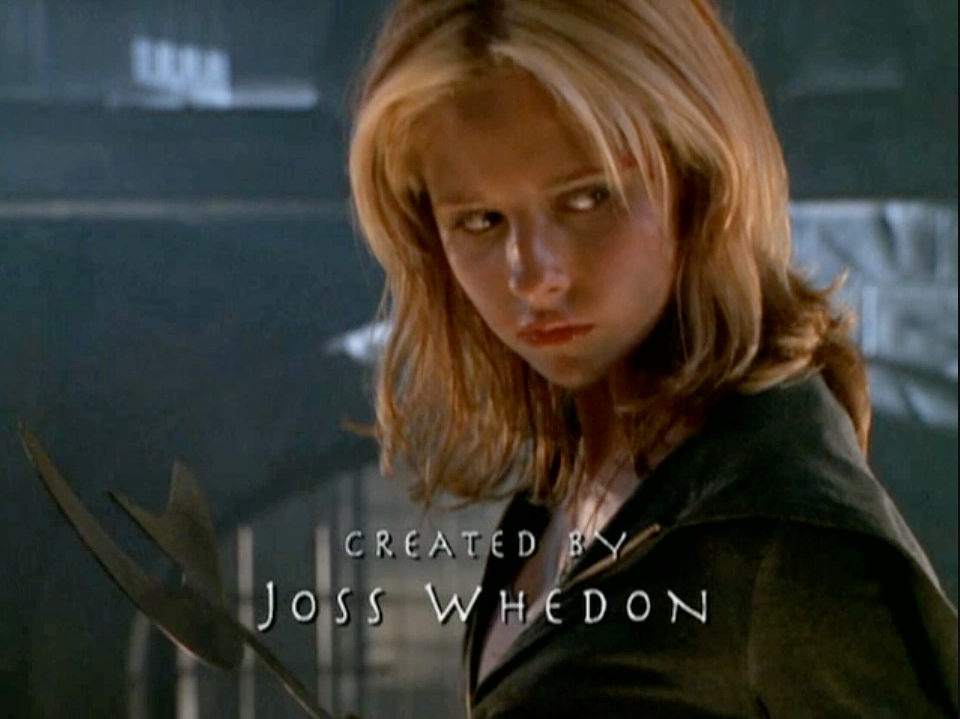
The metaphor for what the world expects from women is not particularly subtle.
The Content
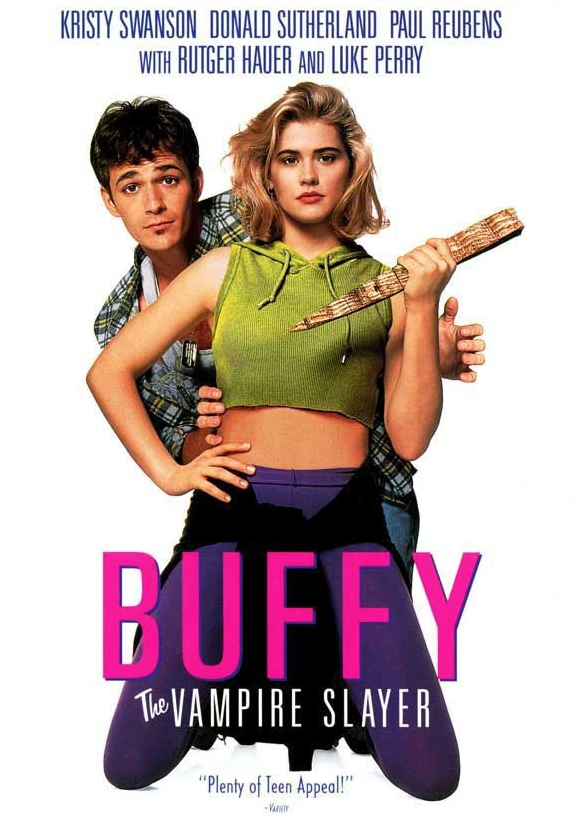
This franchise kicked off in 1992 with a movie in which one Buffy Summers (Kristy Swanson) finds out she's the newest Slayer.
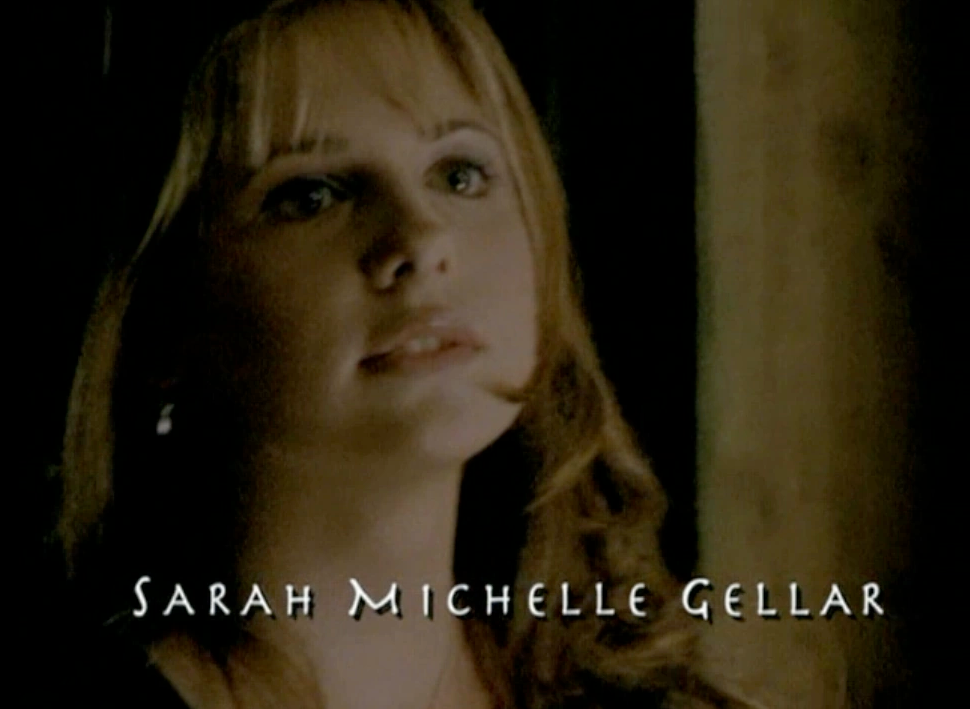
A TV spinoff ran from 1997-2003, with Sarah Michelle Gellar in the title role. In the show, Buffy accumulates a band of friends, known as the Scooby Gang, who help her fight evil. One such Scooby, played by David Boreanaz, gets his own spinoff, Angel (1999-2004).
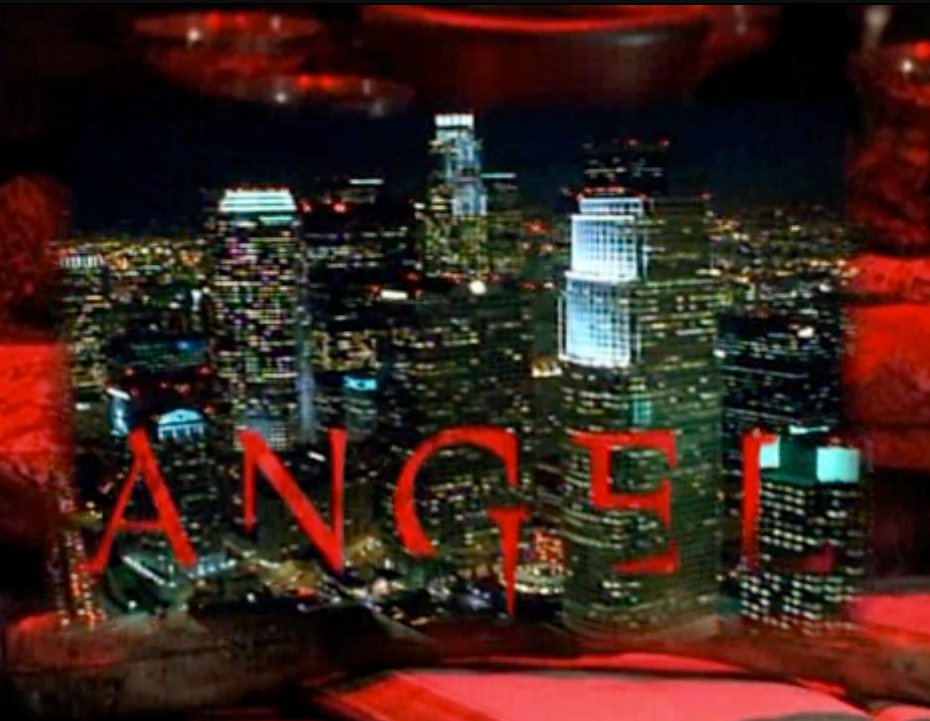
It adds up to 256 episodes of TV, plus the movie, giving us a total runtime of 193.5 hours. This puts Buffy in the middle of the pack for contestant screentime: Bond, Kirk, and MacGyver have less, while Sam Winchester, Drs. Jackson and Carter, and Joe Cartwright all have more.
Both BTVS and Angel have official continuation comics, and there's a sequel in the form of an Audible original series Slayers (2023). Since this blog focuses on movies and TV, I'm not going to count those in the screentime calculation. I have referred to them for plot points that might affect Buffy's Love Interest Mortality statistics, however.
The Times
Anyone else miss the 90s? When I was reading about this franchise, I saw that one episode's airdate was delayed due to the US invading Iraq. I did a double-take because, after 21 years, I find it hard to remember a time when the US didn't have troops in Iraq.
In terms of feminist history, however, I'd like to note that BTVS was born out of the 90s "Girl Power" movement. The movie's premise is essentially "what if the blonde cheerleader was the hero of a horror movie, not its first victim?" And lo, it was considered revolutionary for the times. Serious media scholarship was written about Buffy. There were conferences and gender studies courses based on it. Joss Whedon won an award from Equality Now and spoke on international stages. Sounds great, right?
Alas, entire books have been written about how the 90s never delivered on their promise of gender equality. Neither has Whedon, who turned out to be an abusive man whose feminism was just whistling Dixie. There was quite a lot of that going in the 90s, it would seem. After all, President Clinton signed the Violence Against Women Act while also sexually harassing his female employees.
Scratch what I said earlier: I don't really miss the 90s. I just like that era's TV shows.
Are there any women...
On-Screen?
Heck yeah! First and most obviously, there's Buffy herself. She's surrounded by other tough ladies, such as:
- Willow Rosenberg (Alyson Hannigan), a research whiz who becomes a powerful witch;
- Faith (Eliza Dushku), a second Slayer who famously says "Thank God we're hot chicks with superpowers;"
- Cordelia Chase (Charisma Carpenter), a stuck-up rich girl who's brave enough to bluff any monster into submission;
- Joyce (Kristine Sutherland), Buffy's mother who wins over vampires with the power of hot cocoa;
- Dawn (Michelle Trachtenberg), her sister who doesn't exist until a universe-altering spell creates her in season 5 but who goes on to kick some major demon ass; and
- an entire house full of teenaged potential slayers, whom Buffy trains into an army in season 7.
Regrettably, all these badasses had to deal with a very hostile workplace, courtesy of their fake-feminist boss. Whedon was boinking at least two of the actresses (and don't ask which two, because the press has been polite enough to keep their names out of it.) His defense of his actions is downright cringeworthy:
“I feel fucking terrible about [the affairs],” he said. When I pressed him on why, he noted “it messes up the power dynamic,” but he didn’t expand on that thought. Instead, he quickly added that he had felt he “had” to sleep with ... beautiful young women — the sort of women who had ignored him when he was younger — [because] he feared if he didn’t have sex with them, he would “always regret it.”
- As told to Lila Shapiro of Vulture
So, uh, yeah. On top of which, Whedon also infamously fired Charisma Carpenter after she got pregnant during the production of Angel, unceremoniously killing her character off and inspiring the hashtag #justiceforcordelia. If that's not bad enough, Michelle Trachtenberg, who joined the show at age 15, reports that her guardians wouldn't let Whedon be alone with her (though she refuses to elaborate on why.) And that's not even mentioning that James Marsters (who played the vampire Spike) once wrote a song about how sexy the underage Trachtenberg was. He's 23 years older than her.
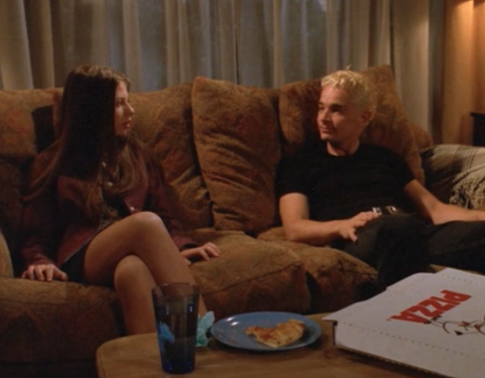
Please join me in a "yeeachhh."
Knowing all the sexist shenanigans that were going on at this set, I am nearly too terrified to ask whether there were any women...
Behind the Scenes?
Phew, it looks like the answer is yes. Both Buffy and Angel had women on the writing staff, such as Rebecca X (nee Kirshner), Jane Espenson, Marti Noxon, Jeannine Renshaw, and Mere Smith. There were significantly fewer episodes directed by women, but there were stories on the screen that represented a female perspective.
That said, the women in the writers' room have confirmed some aspects of Whedon's abusive behavior, such as him making one of them cry with harsh feedback. Even the ones who've defended him have acknowledged that he could be a jerk.
“Did he approach giving notes in a way that was healthy and consistent with the ideals of the endeavor?” she wondered. “No. He’s a blunt instrument, but I’m a very delicate receiver.”
- Rebecca X, quoted in Vulture
One more yeeachhh for the road, then.
Why is this a candidate for the DFGRR?
Got to hand it to you, Goldilocks, you have bleedin' tragic taste in men.
- Spike criticizes Buffy, prior to falling in love with her himself ("Goodbye Iowa," 2000-02-15)
Simply put, because it has a reputation for killing off Buffy's boyfriends. For how accurate that reputation is, you'll have to tune in next post. In the interim, keep your sexy lamps burning - and maybe pack a stake.
Buffy spinning her trusty stake, via GIPHY